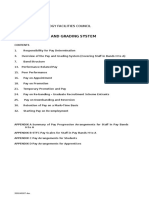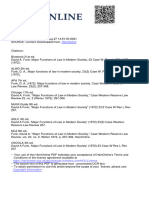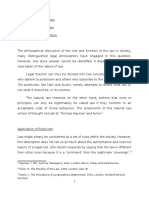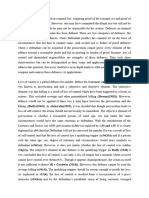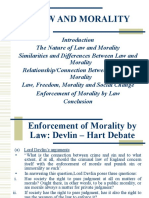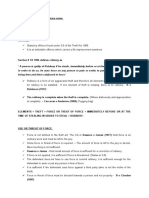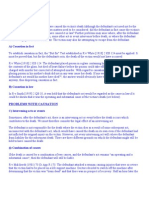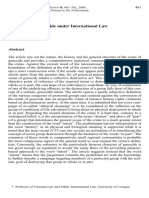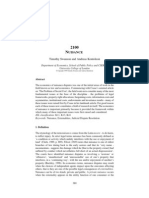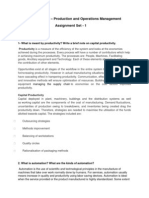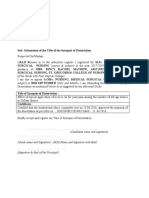Worksheet 1 With Notes
Worksheet 1 With Notes
Uploaded by
jadag9501Copyright:
Available Formats
Worksheet 1 With Notes
Worksheet 1 With Notes
Uploaded by
jadag9501Original Title
Copyright
Available Formats
Share this document
Did you find this document useful?
Is this content inappropriate?
Copyright:
Available Formats
Worksheet 1 With Notes
Worksheet 1 With Notes
Uploaded by
jadag9501Copyright:
Available Formats
Worksheet 1 With Notes
Law and Morality
What is a crime?
“...a legal wrong for which the offender is liable to be prosecuted by or in the name of the State,
and if found guilty, liable to be punished.”
-- Card, Cross & Jones
There must be a “legal wrong”. How do we decide what is a “legal wrong”?
A. Legal Moralism
The Test: Does the conduct (or omission) offend the community spirit?
B. The Harm Principle
The Test: Will this conduct (or omission) cause harm or serious offence to others?
C. Paternalism
The Test: Is the conduct (or omission) something from which we must protect the offender?
© Nicholas Kellyman Criminal Law 1
What is the difference between criminal and civil liability?
Criminal Liability Civil Liability
•Concerned with public wrongs •Concerned with private rights
•Concerned with condemning and punishing the •Concerned with compensating the
guilty injured victim
•The State brings action (in the form of the police •Victim decides whether to bring suit .
and the DPP)
•Criminal case is brought in the name of the Crown •Civil case is brought in the name of the
(R v. Defendant) injured party (Claimant v. Defendant)
•Concerned with moral fault and blameworthiness •Concerned with victim compensation
•Prosecution must establish its case by proof beyond •Claimant must establish her case on a
a reasonable doubt balance of probabilities
Nature and Purpose of Criminal Law
What is at the heart of criminal law?
Criminal law is about:
•Public wrongs
•Harm to society
•Moral fault
•blameworthiness
•Coercing behaviour
C. Aims of Criminal Punishment
What are the aims of criminal punishment?
American Law Institute’s Modern Penal Code (Art. 1 1.02)
(a)To forbid and prevent conduct that unjustifiably and inexcusably inflicts or threatens
substantial harm to individual or public interests
(b)To subject to public control persons whose conduct indicates that they are disposed to
commit crimes
(c)To safeguard conduct that is without fault from condemnation as criminal
(d)To give fair warning of the nature of the conduct declared to be an offence
(e)To differentiate on reasonable grounds between serious and minor offences
© Nicholas Kellyman Criminal Law 1
What are the aims of criminal punishment?
Retribution: Biblical justification Leviticus 24:17-22 – When one man strikes another and kills
him, he shall be put to death. Whoever strikes a beast and kills it shall make restitution, life for
life...fracture for fracture, eye for eye, tooth for tooth... Forestalls the need for private revenge
Restraint: Offenders need to be separated from the rest of society in order to protect citizens
from their committing other offences -- goal is preventing future offending but this often leads
to a disproportionate sentence
Rehabilitation: Offenders must be given the social, educational, or vocational training necessary
to allow them to behave the way in which we would want them to behave
Deterrence: Would-be offenders must be discouraged from engaging in criminal activity so
actual offenders are made examples of
D. Relationship Between Law and Morals
“Morality and criminality are far from co-extensive, nor is the sphere of criminality necessarily
part of a more extensive field covered by morality.”
-- Lord Atkin Proprietary Articles Trade Association v. A.G. for Canada [1931] A.C. 310, 324
What does the Wolfenden Committee Report say?
The Function of the Criminal Law is to:
•preserve public order and decency
•protect the citizen from what is offensive or injurious
•provide sufficient safeguards against exploitation or corruption of others The Function of the
Criminal Law is not to:
•intervene in the lives of citizens or to seek to enforce any particular pattern of behaviour
There must remain a realm of private morality and immorality, which is in brief and crude
terms, not the law’s business
© Nicholas Kellyman Criminal Law 1
What is the Libertarian view? Who espouses this view? What cases discuss this view?
John Stuart Mill: “...the only purpose for which power can be rightfully exercised over any
member of a civilised community against his will is to prevent harm to others.”
What is the Authoritarian view? Who espouses this view? What cases discuss this view?
Sir James Stephen: “...there are acts of wickedness so gross and outrageous that... they must be
prevented as far as possible at any cost to the offender, and punished... with exemplary severity.”
LORD DEVLIN H.L.A. HART
➭Touted the dangers of a prejudiced ill-informed ➭Society may use criminal law to preserve
majority public morality when public feeling rises to
“intolerance, indignation and disgust”
➭Like John Stuart Mill, we must protect against ➭The man in the jury box is the person who
harms decides what is moral
➭Rejected the idea that deviation from accepted ➭There are no theoretical limits to legislation
sexual morality, even by adults in private, is against immorality
something which, threatens the existence of society
Cases to support argument: Cases to support argument:
Shaw v D.P.P. (1962) A.C. 220
Knuller v D.P.P. (1972) 2 All E.R. 898
R v Brown (1993) 2 All E.R. 75
Shaw v. D.P.P (1962) A.C. 220
The Court is the custos morum of the people
➭Lord Simonds: “courts of law [has] a residual power … to conserve …the moral welfare of the
State …”
➭Lord Reid (dissenting): It is not the courts place to be making laws to protect morality
“Parliament is the proper place” to do so.
Knuller Ltd. v. D.P.P (1972) 2 All E.R. 898
Conspiracy to corrupt public morals is an offence
© Nicholas Kellyman Criminal Law 1
➭Lord Reid: “...if people choose to corrupt themselves in this way that is their affair and the law
will not interfere. But no licence is given to others to encourage the practice.”
Chief of Police v. Nias (2008) 73 WIR 201
➭Rawlins CJ: Parliament is the voice of the people and makes the law not the court
Dolly Kendall v. Khan (1979) 26 WIR 433
➭Crane CJ: “virtue ought not be secured by legislation but should be inculcated on the minds of
the people.”
Principle of Legality (NULLA POENA SINE LEGE)
What is the Principle of Legality?
“No penalty without a law”
Conduct which is not proscribed by law should not be punished
Legality in Shaw
Shaw v. D.P.P (1962) A.C. 220
Is conspiracy to corrupt public morals an offence?
➭Majority of the court says no: But, the courts has a duty to superintend those offences which
were prejudicial to the public welfare
➭Lord Reid says yes: Conspiracy to corrupt public morals was a common law misdemeanour and
there was evidence fit to be left to the jury on which the appellant could be found guilty of this
offence.
Legality in Knuller
Knuller Ltd. v. D.P.P (1972) 2 All E.R. 898
Is it a crime to encourage legal behaviour?
➭Per Curiam: Yes because though not illegal, the conduct might be calculated to corrupt public
morals - it was for the jury to decide whether by present-day standards the advertisements did
so”
➭Lord Reid: “...if people choose to corrupt themselves in this way that is their affair and the law
will not interfere. But no licence is given to others to encourage the practice.”
What is the presumption of innocence? Which cases discusses this?
© Nicholas Kellyman Criminal Law 1
The notion in criminal law that the defendant is presumed to be innocent until proven guilty.
Thus the burden of proving all the elements of the offence lies with the prosecution and the
prosecution must prove its case beyond any reasonable doubt.
Supporting Case: Woolmington v D.P.P. (1935) A.C. 462
F. Sources of Criminal Law in the West Indies
What are the sources of Caribbean criminal law?
1.The Written Constitution – Ultimate source of power and authority
•Establishes fundamental principles governing society
•Savings Law Clause (Does this simply codify existing rights? What about the death
penalty?)
2.Legislation – The will of the people
•Can be an instrument of change and innovation
3.Common Law
•Stare decisis :- The policy of courts to abide by or adhere to principles established by
decisions in earlier cases
•Obiter dicta:- An opinion voiced by a judge that has only incidental bearing on the case
in question and is therefore not binding
4.International Law
Woolmington v D.P.P. (1935) A.C. 462
D in an attempt to persuade his wife to return home threatened her that he would
commit suicide, as he showed her the gun that he was going to kill himself with, it went
off accidentally killing her. D was convicted of murder and sentenced to death.
Appeal made on the grounds of Jury misdirection and death penalty thrown out
Rule: Burden of proof in criminal trials lies on the prosecution.
R v Price (1883-84) 12 Q.B.D. 247
Shaw v D.P.P. (1962) A.C. 220
D was convicted of conspiracy to corrupt public morals for publishing for sale a 'ladies
directory' which listed contact details of prostitutes, the services they offered and nude
© Nicholas Kellyman Criminal Law 1
pictures.
D appealed on the grounds that no such offence of conspiracy to corrupt public morals
existed.
Held: The appeal was dismissed. The House of Lords in effect created a new crime.
Rule: A publisher who encourages immoral behaviour through explicit content in a
magazine or periodical is guilty of conspiracy to corrupt public morals.
Knuller v D.P.P. (1972) 2 All E.R. 898
The defendant published a magazine with advertisements of homosexuals seeking to
meet other like-minded individuals to engage in sexual practices.
They were charged with conspiracy to corrupt public morals as established in Shaw v
DPP.
The House of Lords doubted the correctness of the decision in Shaw but declined to
depart from it.
Rule: A publisher who encourages immoral behaviour through explicit content in a
magazine or periodical is guilty of conspiracy to corrupt public morals.
R v Brown (1993) 2 All E.R. 75
5 defendants were found guilty of assault occasioning bodily harm for participating in
consensual sado-masochistic homosexual activity in which the defendants suffered no
permanent injury.
Rule: Consent is no defence to an assault causing grievous bodily harm.
Kendall & others v Khan (1979) 26 W.I.R. 433
The three persons were arrested in a cinema by a party of policemen after they failed to
stand up while the national anthem of Guyana was being played. They were charged for
insulting a police officer and eventually found guilty.
On appeal the conviction and sentence for the three appellants were set aside because
though the conduct may be viewed as annoying, it cannot be said to be insulting
conduct.
Rule: “virtue ought not be secured by legislation but should be inculcated on the minds
of the people.”
Chief of Police and another v Nias (2008) 73 W.I.R. 201
The respondent was found guilty of using abusive language to a woman in a public place
contrary to a section of the Small Charges Act of St Christopher and Nevis. An appeal
was made on the grounds that this infringed on the constitutional right to freedom of
© Nicholas Kellyman Criminal Law 1
speech.
Rule: Parliament is the voice of the people and makes the law not the court
© Nicholas Kellyman Criminal Law 1
You might also like
- LAW 1010 LLS Exam PreparationDocument29 pagesLAW 1010 LLS Exam PreparationJaneNo ratings yet
- Worksheet 5 With NotesDocument11 pagesWorksheet 5 With Notesjadag9501No ratings yet
- Payroll Sheet QuizDocument5 pagesPayroll Sheet QuizJoneric RamosNo ratings yet
- Criminal Law: Higgins (1801) 2 East 5Document12 pagesCriminal Law: Higgins (1801) 2 East 5Renee FrancisNo ratings yet
- Tort WorkDocument9 pagesTort WorknickakillermanNo ratings yet
- LAW Question On Tort-Rylands and FletcherDocument4 pagesLAW Question On Tort-Rylands and FletcherRyan Ramkirath100% (1)
- OmissionsDocument6 pagesOmissionsAnalily CepedaNo ratings yet
- S V MHARAPARA 1985 (2) ZLR 211Document9 pagesS V MHARAPARA 1985 (2) ZLR 211Anesu KarandaNo ratings yet
- TLE-TE-10 Q1 W3 Mod3 ICT-CSSDocument23 pagesTLE-TE-10 Q1 W3 Mod3 ICT-CSSMarlon Sevilla100% (1)
- STFC Pay Grading System 3Document9 pagesSTFC Pay Grading System 3nishantNo ratings yet
- Jurisprudence The Hart-Devlin Debate: Faiznur Yazreen Nur Diana Zarith Satina LWB05FDocument36 pagesJurisprudence The Hart-Devlin Debate: Faiznur Yazreen Nur Diana Zarith Satina LWB05FDiana Ramlan50% (2)
- Study Guide 8 - Incohate OffencesDocument10 pagesStudy Guide 8 - Incohate OffencesSurihya101No ratings yet
- Funk - Major Functions of LawDocument51 pagesFunk - Major Functions of Lawgabriellacarmichael21No ratings yet
- Powerpoint 9 Defences 1Document21 pagesPowerpoint 9 Defences 1JelisaNo ratings yet
- 8 - General Defences To Criminal LiabilityDocument33 pages8 - General Defences To Criminal Liabilitymanavmelwani100% (2)
- Criminal Law II Non Fatal OffencesDocument14 pagesCriminal Law II Non Fatal OffencesMauricia LawrenceNo ratings yet
- CRIMINAL lAW SUMMARYDocument81 pagesCRIMINAL lAW SUMMARYNavin Soborun100% (1)
- Functions of Law in Modern SocietyDocument51 pagesFunctions of Law in Modern Societyjagadesh100% (1)
- That The Accused (A-1) and Co-Accused (A-2) Are Guilty of MurderDocument9 pagesThat The Accused (A-1) and Co-Accused (A-2) Are Guilty of MurderishichadhaNo ratings yet
- Theft Burglary - Updated!Document6 pagesTheft Burglary - Updated!Sher KhanNo ratings yet
- 1) "Despite It Being Such An Important Concept, The Meaning of Intention Has Caused Problems For The Courts."Document13 pages1) "Despite It Being Such An Important Concept, The Meaning of Intention Has Caused Problems For The Courts."George WatkinNo ratings yet
- Study Guide 5 - CausationDocument7 pagesStudy Guide 5 - CausationSurihya10150% (2)
- Torts - Assault BatteryDocument22 pagesTorts - Assault BatteryAyush PandeyNo ratings yet
- Tort NotesDocument4 pagesTort NotesaarushipanditNo ratings yet
- Legitimate ExpectationDocument9 pagesLegitimate ExpectationMAINAMPATI SATHVIK REDDYNo ratings yet
- Lect. 2 Natural and Positive LawDocument5 pagesLect. 2 Natural and Positive LawSasha Frankson0% (1)
- ESSAY Loss of ControlDocument5 pagesESSAY Loss of ControlBarrister Rabbiul Alam RafiNo ratings yet
- Armon V KatzDocument9 pagesArmon V KatzNaana Awuku-Apaw100% (1)
- Assignment Law038: MURDERDocument34 pagesAssignment Law038: MURDERazwar_kamaruzaman94No ratings yet
- FOUN 1301 1ST MCQ - Attempt ReviewDocument21 pagesFOUN 1301 1ST MCQ - Attempt ReviewDanyelle samaroo100% (1)
- TMUC Criminal SessionalDocument3 pagesTMUC Criminal SessionalAbdul Rahman ZAHOOR100% (1)
- All ER 1989 Volume 2Document1,134 pagesAll ER 1989 Volume 2AlanNo ratings yet
- Mens Rea - Essay Question - StructureDocument2 pagesMens Rea - Essay Question - StructureAbdul Rahman ZAHOORNo ratings yet
- Actus Reus LectureDocument4 pagesActus Reus LectureSyed HassanNo ratings yet
- Extra Case Law 2022-2023 - Contract and Tort Law 2Document41 pagesExtra Case Law 2022-2023 - Contract and Tort Law 2RodrigoNo ratings yet
- Quick Law NotesDocument2 pagesQuick Law NotesZachary CoxNo ratings yet
- LAW Question On NuisanceDocument5 pagesLAW Question On NuisanceRyan RamkirathNo ratings yet
- Topic 3d. Law & MoralityDocument17 pagesTopic 3d. Law & MoralityYuvanesh KumarNo ratings yet
- Defence EsaayDocument6 pagesDefence EsaayMahdi Bin MamunNo ratings yet
- Robbery and Burglary Revision NotesDocument4 pagesRobbery and Burglary Revision Notesrj1704No ratings yet
- Offences Against The PersonDocument34 pagesOffences Against The PersonPeaches sparkNo ratings yet
- CausationDocument36 pagesCausationAINN THURAYANo ratings yet
- Criminal Law CasesDocument97 pagesCriminal Law CasesNivedita MisraNo ratings yet
- Concept XVI - EasementsDocument13 pagesConcept XVI - EasementsShaniah WilliamsNo ratings yet
- Hyam V DPP (1974) UKHL 2 (21 March 1974) PDFDocument31 pagesHyam V DPP (1974) UKHL 2 (21 March 1974) PDFRam PurNo ratings yet
- Jeopardy of Tort 2Document3 pagesJeopardy of Tort 2Anonymous lTXTx1fNo ratings yet
- Family Law I Introductory Lecture W1Document2 pagesFamily Law I Introductory Lecture W1JelisaNo ratings yet
- Part One: London College of Legal Studies (South)Document3 pagesPart One: London College of Legal Studies (South)Saadat Bin SiddiqueNo ratings yet
- Module 1 - Handout On Definition, PVT International Law, MythsDocument8 pagesModule 1 - Handout On Definition, PVT International Law, MythsVivek Vaibhav100% (1)
- Analysis of Lucille Mathurin Mair - Prof. Verene ShepherdDocument16 pagesAnalysis of Lucille Mathurin Mair - Prof. Verene ShepherdRahul RoopchandNo ratings yet
- A V Secretary of State For The Home DepartmentDocument4 pagesA V Secretary of State For The Home DepartmentRic SaysonNo ratings yet
- AQA A Level Law Assessment On Law On Nonfatal OffencesDocument2 pagesAQA A Level Law Assessment On Law On Nonfatal OffencesJonathan SmithNo ratings yet
- Evon Smith Vs The QueenDocument12 pagesEvon Smith Vs The QueenDKzNo ratings yet
- Sample Essay Question Criminal LawDocument1 pageSample Essay Question Criminal Lawhasnat shahriarNo ratings yet
- Criminal Law I - Cameron - 2014-2015Document10 pagesCriminal Law I - Cameron - 2014-2015anar beheheheNo ratings yet
- Tort Part 2Document50 pagesTort Part 2matthew WilliamsNo ratings yet
- CausationDocument5 pagesCausationkristen_035100% (1)
- Comment and Views Regarding Crime of Genocide Under International LawDocument42 pagesComment and Views Regarding Crime of Genocide Under International Lawshilpasingh1297No ratings yet
- Tort Part 1Document92 pagesTort Part 1matthew WilliamsNo ratings yet
- NuisanceDocument23 pagesNuisancelegalmatters100% (2)
- Law Firm Strategies for the 21st Century: Strategies for Success, Second EditionFrom EverandLaw Firm Strategies for the 21st Century: Strategies for Success, Second EditionChristoph H VaagtNo ratings yet
- Administration of JusticeDocument31 pagesAdministration of JusticeMunirah JahanNo ratings yet
- CSR-2 Form DetailsDocument43 pagesCSR-2 Form DetailsSimardeep SinghNo ratings yet
- MB0044 - Production and Operations Management Assignment Set - 1Document8 pagesMB0044 - Production and Operations Management Assignment Set - 1Ravi GuptaNo ratings yet
- Leadership Module 3 Study GuideDocument14 pagesLeadership Module 3 Study GuideKEI DEL ROSARIONo ratings yet
- Blecic&Partners Law Firm ProfileDocument6 pagesBlecic&Partners Law Firm ProfileBlecic&PartnersNo ratings yet
- Ce Ped 2014-68-Eu CertificateDocument1 pageCe Ped 2014-68-Eu CertificateAvinish dubeyNo ratings yet
- Aurelio 2013Document25 pagesAurelio 2013Ralf PayongaNo ratings yet
- Perpetuity Annuity 2Document50 pagesPerpetuity Annuity 2baldonangelie29No ratings yet
- Operation & Maintenance Manual Supplement: Dozer Access SystemDocument19 pagesOperation & Maintenance Manual Supplement: Dozer Access SystemGhassan Ilias AlkikiNo ratings yet
- Body Shaping SystemDocument7 pagesBody Shaping SystemEladasaNo ratings yet
- Tips For Parents of VegansDocument2 pagesTips For Parents of VegansVegan FutureNo ratings yet
- New 8fbn 15 30tDocument7 pagesNew 8fbn 15 30tLực NguyễnNo ratings yet
- SAP QM Calibration MethodDocument3 pagesSAP QM Calibration MethodvrkattulaNo ratings yet
- Service Manual Service Manual: Gn2SkDocument224 pagesService Manual Service Manual: Gn2SkClubedoTecnicoNo ratings yet
- BestPower 610 Family 7 To10 kVA (Specs)Document2 pagesBestPower 610 Family 7 To10 kVA (Specs)Kostas TsoumanisNo ratings yet
- DBMS Lab ManualDocument66 pagesDBMS Lab ManualMargie VilloriaNo ratings yet
- #1 Sample Caption For General Pleadings: Omit If Not Necessary On The Particular PleadingDocument3 pages#1 Sample Caption For General Pleadings: Omit If Not Necessary On The Particular PleadingMarloNo ratings yet
- XIBO Introduction and Basic OperationDocument18 pagesXIBO Introduction and Basic Operationsteve848130No ratings yet
- The Nursing ProcessDocument8 pagesThe Nursing ProcessSonia G. Ortiz100% (1)
- Case Study of Electrical AccidentDocument5 pagesCase Study of Electrical AccidentSr. DEENo ratings yet
- BurningrateDocument60 pagesBurningrateasuNo ratings yet
- Objectives: Logon To SAP From VB. Use of BAPI. Creation of Sales Order Using BAPIDocument9 pagesObjectives: Logon To SAP From VB. Use of BAPI. Creation of Sales Order Using BAPIAdemNo ratings yet
- #Ieltsdori - Vocabulary For Academic IELTS Writing Task 1Document51 pages#Ieltsdori - Vocabulary For Academic IELTS Writing Task 1Quang LinhNo ratings yet
- O 0057Document2 pagesO 0057mikocorpusNo ratings yet
- Sugar FactoryDocument41 pagesSugar Factory4PS19AU411 Syeda Soubiya MuskanNo ratings yet
- Corrected Proposal Corrected.Document10 pagesCorrected Proposal Corrected.Preeti ChouhanNo ratings yet
- DWM Unit 1. Introduction To Data WarehousingDocument12 pagesDWM Unit 1. Introduction To Data Warehousingjemsbonnd100% (4)
- Report Warehouse ManagementDocument37 pagesReport Warehouse ManagementChau AnhNo ratings yet









